

Scarecrow (Oz) The Scarecrow is a character in the fictional Land of Oz created by American author L.
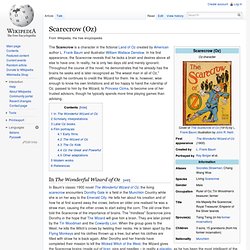
Frank Baum and illustrator William Wallace Denslow. In his first appearance, the Scarecrow reveals that he lacks a brain and desires above all else to have one. In reality, he is only two days old and merely ignorant. Throughout the course of the novel, he demonstrates that he already has the brains he seeks and is later recognized as "the wisest man in all of Oz," although he continues to credit the Wizard for them. He is, however, wise enough to know his own limitations and all too happy to hand the rulership of Oz, passed to him by the Wizard, to Princess Ozma, to become one of her trusted advisors, though he typically spends more time playing games than advising.
His desire for a brain notably contrasts with the Tin Woodman's desire for a heart, reflecting a common debate between the relative importance of the mind and the emotions. He spars with H. If I Only Had A Brain. Ray Bolger. Early life[edit] Career[edit] In 1946 he returned to MGM for a featured role in The Harvey Girls.
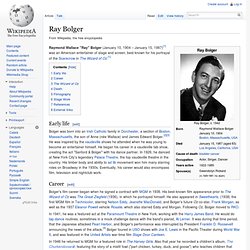
Cowardly Lion. The Cowardly Lion is a character in the fictional Land of Oz created by American author L.
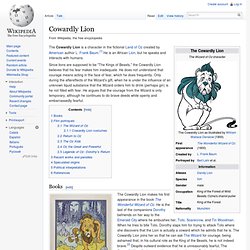
Frank Baum.[1] He is an African Lion, but he speaks and interacts with humans. Since lions are supposed to be "The Kings of Beasts," the Cowardly Lion believes that his fear makes him inadequate. He does not understand that courage means acting in the face of fear, which he does frequently. Only during the aftereffects of the Wizard's gift, when he is under the influence of an unknown liquid substance that the Wizard orders him to drink (perhaps gin) is he not filled with fear. He argues that the courage from the Wizard is only temporary, although he continues to do brave deeds while openly and embarrassedly fearful. Books[edit] Dorothy meets the Cowardly Lion, from the first edition. The Wizard gives him a dish of unknown liquid, telling him it is "courage" to drink. His favored companion is the Hungry Tiger. Bert Lahr. Tin Woodman.
The Tin Woodman, sometimes referred to as the Tin Man or (incorrectly) the Tin Woodsman, (the third name appears only in adaptations, the first—and in rare instances, the second—was used by Baum), is a character in the fictional Land of Oz created by American author L.
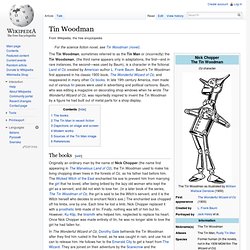
Frank Baum. Baum's Tin Woodman first appeared in his classic 1900 book, The Wonderful Wizard of Oz, and reappeared in many other Oz books. In late 19th century America, men made out of various tin pieces were used in advertising and political cartoons. Baum, who was editing a magazine on decorating shop windows when he wrote The Wonderful Wizard of Oz, was reportedly inspired to invent the Tin Woodman by a figure he had built out of metal parts for a shop display. Jack Haley. Early life[edit] Haley was born in Boston to Irish Americans John Joseph Haley and his wife Ellen Curley.
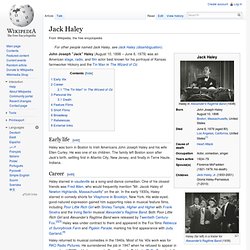
He was one of six children. The family left Boston soon after Jack's birth, settling first in Atlantic City, New Jersey, and finally in Terre Haute, Indiana. Career[edit] Haley returned to musical comedies in the 1940s. "The Tin Man" in The Wizard of Oz[edit] Personal life[edit] Haley (second from left) on May 30, 1979, one week before his death Haley was raised Roman Catholic.[6] He was a member of the Good Shepherd Parish and the Catholic Motion Picture Guild in Beverly Hills, California.[7] He married Florence McFadden, a native of Wilkes Barre, Pennsylvania on February 25, 1921, and they were married until his death.
They had a son, Jack Haley, Jr., a successful film producer; and a daughter, Gloria.[8] Jack Haley, Jr. married Liza Minnelli, daughter of Oz co-star Judy Garland, in 1974. Dorothy Gale. Sources[edit] Lee Sandlin writes that L.
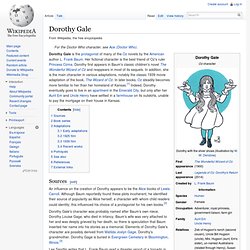
Judy Garland. Judy Garland (born Frances Ethel Gumm; June 10, 1922 – June 22, 1969) was an American actress, singer, and vaudevillian.
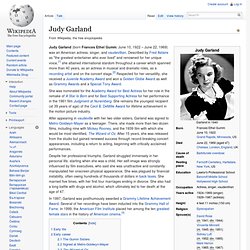
Described by Fred Astaire as "the greatest entertainer who ever lived" and renowned for her unique voice,[1] she attained international stardom throughout a career which spanned more than 40 years, as an actress in musical and dramatic roles, as a recording artist and on the concert stage.[2] Respected for her versatility, she received a Juvenile Academy Award and won a Golden Globe Award as well as Grammy Awards and a Special Tony Award. Despite her professional triumphs, Garland struggled immensely in her personal life, starting when she was a child. Her self-image was strongly influenced by film executives, who said she was unattractive and constantly manipulated her onscreen physical appearance. She was plagued by financial instability, often owing hundreds of thousands of dollars in back taxes. Early life[edit] Early career[edit]